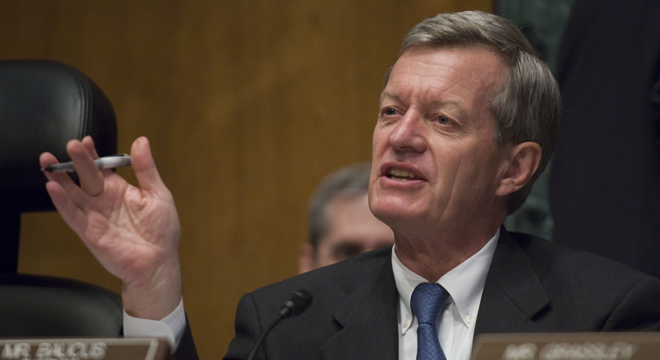The chair of the Senate’s most powerful fiscal committee predicted Monday that Republicans will vote for a revenue-increasing tax reform proposal in the coming months. But the details will have to remain tightly held and leaders will have to avoid extraneous partisan skirmishes to provide both Democrats and Republicans the flexibility they’ll need to take contentious votes after the election.
“I’m making progress on a detailed tax reform proposal that will attract bipartisan supports,” Senate Finance Committee chairman Max Baucus (D-MT) told reporters and guests at the Bipartisan Policy Center.
For months in 2009, Baucus led Senate Dems’ failed effort to round up GOP votes for President Obama’s health care law. Now, he says, members of both parties are warming to templates for deficit reduction legislation that include cuts to popular social programs and significantly higher tax revenues.
“The better approach at this point in June…is to do what many of us are doing, mainly engage in a lot of discussions, Republicans and Democrats, I’ve attended many such meetings over the last several weeks, by and large keying off of Rivlin-Domenici, keying off of Bowles-Simpson,” Baucus said. “They tend to be rough starting points that people tend to agree with.”
What could derail these efforts? Baucus admits many in the Senate disagree with him, but he’s worried that legislative politicking meant to emphasize differences between the parties will doom substantive policymaking after the election.
“We should try to avoid divisive votes prior to the election,” Baucus said. “Because I don’t want members of the House and Senate too locked in to make it difficult in the lame duck to do what’s correct.”
Baucus therefore declined to discuss specific details of his plan, and limited himself mainly to describing the procedural approach he plans to take. At the beginning of 2013, all of the Bush tax cuts are set to expire, and deep automatic spending cuts are scheduled to kick in creating a strong imperative for Congress to steer away from the so-called “fiscal cliff” toward more measured tax and spending reforms. But forcing the GOP’s hand on allowing revenues to increase might require Democrats to allow the tax cuts to expire temporarily, and then reintroduce a modest package of tax cuts in January. But if they lose control of the Senate and fail to take control of the House in November — or if President Obama loses — they’ll have a much harder time accomplishing that goal.






